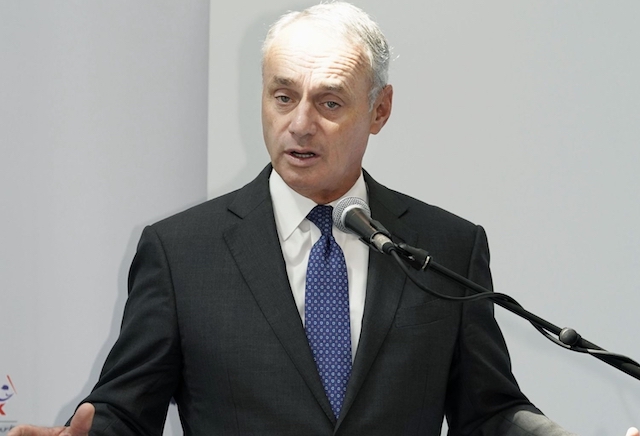When Major League Baseball first pushed back Opening Day of the 2020 season due to the coronavirus (COVID-19) pandemic, the hope was play would begin after the two-week period. However, the start of the season was delayed again amid a challenging new reality.
Matters became even more complicated as MLB and the Players Association would ultimately disagree on the interpretation of a March 26 deal that among other items, called for prorated salaries. The two sides also were at odds over the length of the regular season.
Failed negotiations ultimately led to MLB commissioner Rob Manfred moving ahead with imposing a 60-game season. Players began reporting for Spring Training 2.0 on Wednesday, and the Los Angeles Dodgers are scheduled to hold their first official workout Friday.
In an appearance on “The Dan Patrick Show,” Manfred explained the league never planned on a season that would extend beyond 60 games:
“The reality is we weren’t going to play more than 60 games no matter how the negotiations with the players went, or any other factor. … I think this is the one thing we come back to every single day: we’re trying to manage something that has proven to be unpredictable and unmanageable. I know it hasn’t looked particularly pretty in spots, but having said that, if we can pull of this 60-game season, I think it was the best we were going to do for our fans given the course of the virus.
“It’s the calendar. We’re playing 60 games in 63 days right now. I don’t see, given the reality of the health situation over the past few weeks, how we were going to get going any faster than the calendar we’re on right now. No matter what the state of those negotiations were.”
During the early stages of negotiations there were reports that indicated MLB was hopeful to have the sport return for Opening Day on July 4. However, those within the MLBPA were more convinced team owners purposely stalled negotiations to push back the start date and thus cut into the number of games that could be played.
Just as the union insisted on receiving full prorated salaries this year, MLB remained equally firm in their stance that the regular season not extend beyond Sept. 27. They harbor fears of a second wave of the coronavirus, which could impact the postseason and thus wipe away an opportunity for the league to recoup lost revenues.
Have you subscribed to our YouTube channel? It’s the best way to watch player interviews, exclusive coverage from events, participate in our shows, and more!






